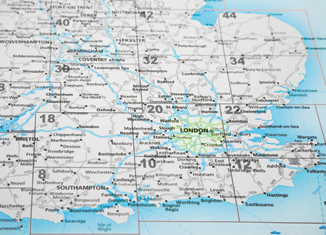Despite mounting financial pressures on households, house prices have continued their upward path this year. At their peak, data from the Office for National Statistics (ONS), from which Hamptons bases its forecast, showed that annual price growth across Great Britain reached 12.9% in May, a 17-year high.
However, the latest data also showed a deceleration of price growth, down to 7.8% in June. Given the length of time - currently 123 days – between a sale being agreed and its completion, Hamptons says we are unlikely to see the impact of more stock and higher mortgage rates on ONS data until early 2023.
‘Therefore, we forecast that the average house price in Great Britain will still end the year 5.0% higher than at the end of 2021, exceeding the 3.5% we forecast last year, but down from 9.2% (annual) growth in Q4 2021. As we approach the end of the current housing market cycle, there has been a gradual narrowing of the North-South house price divide. We think the North West (7.0%), East Midlands (6.5%) and North East (6.0%) will see the strongest price growth in Q4 2022.’
The company added that 2022 will mark the seventh consecutive year where London is set to underperform the rest of Great Britain, forecasting that house prices in the capital will rise by 3.0% in 2022.
2023
Regarding next year, Hamptons stated: ‘The impact of rising mortgage rates is likely to be felt most keenly in 2023 and consequently, we forecast 0% growth across Great Britain over the year. House price growth will steadily slow throughout 2023, with the average house price likely to remain the same as it did in the fourth quarter of 2022.
‘Based on our forecast that the base rate will peak at around 2.5% early next year, mortgages will become noticeably more expensive. Spiralling inflation will also reduce how much households can save and limit their capacity to borrow. This will depress house price growth.’
However, the report added: ‘If interest rates rise further than we expect, which may be the case if inflation proves particularly persistent, house prices may fall. House price falls are most likely in areas where price growth has been strongest over the past few years, and where a larger share of households have bigger mortgages. These include the three Northern regions and the Midlands. Wales and Scotland have the potential to weather the storm better than most other regions, with 1.0% growth. Affordability is less stretched there, and a larger share of homeowners are mortgage-free.’
In Prime Central London (PCL) the firm said that fewer affluent homeowners rely on mortgages, and if sterling continues to weaken against other currencies, London property will become cheaper for international buyers. ‘We forecast that PCL prices will rise by 1.5% next year, with 0.0% growth across Greater London.’
2024
Inflationary pressures should ease in 2024, according to the report, which means real incomes could rise for the first time in two years. As the base rate is lowered to around 2.0%, mortgage costs should fall, aiding affordability it said, adding: ‘Consequently, house price growth should rise to 2.0% across Great Britain by the fourth quarter of 2024, although uncertainty surrounding the outcome of an impending general election may dampen the mood.
‘In our 2021 forecast we predicted that house prices would grow 5.5% between 2023 and 2024, but higher interest rates have derailed such expectations and lowered our 2-year forecast to 2.0%.
‘As we set out in our 2021 forecasts, we think 2024 will mark the end of the current house price cycle which began in 2008. We forecast that London house prices will begin to marginally outperform other regions. We expect growth of 3.0% in 2024, buoyed by a 5.0% jump in PCL. The South East and East of England should be close behind with a rise of 2.5%.
‘By the time the current cycle ends in 2024, house prices are set to have risen by 77% across Great Britain since 2008, with London leading the pack with a jump of 110%. However, this is around a third of the 256% growth seen during the previous cycle (1992 to 2007).’
2025
Looking further ahead, Hamptons forecasts that house price growth by the end of 2025 will be 3.0% across Great Britain, reflecting a rise in households’ real incomes.
The report concluded: ‘The base rate is likely to settle at a new normal of about 1.75%. First-time buyers, the group hardest hit by higher rates, are likely to make a comeback as affordability pressures ease. London will lead the way with 5.0% growth. The increase in flexible working seems set to strengthen the links between the capital and the Southern regions. Their price performance is likely to track that of London more closely in the future. Prime Central London is likely to be the top performing location in 2025, with an upward move of 6.0%. We also expect to see a pickup in the North East as its economy recovers.’




















